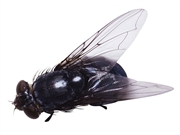Houseflies: Just How Bad Are They for Your Health?
By Alan MozesHealthDay Reporter

FRIDAY, Dec. 6, 2019 (HealthDay News) -- Everyone quickly shoos houseflies off their dinner plates, but exactly how disease-ridden are these pesky insects?
New research reveals that flies do pick up plenty of microbes from the nearby environment -- germs that can then be transmitted to your food or drink.
But there's also reason to relax: Experts agreed that houseflies don't rank high on the list of disease threats.
Even though flies do carry germs, "the chances that these microbes will cause any harm are low," concluded study lead author Rahel Park, a Ph.D.-candidate at the VIB-KU Leuven Center for Microbiology, in Belgium.
Park's team sought to get the latest buzz on houseflies by producing a genetic map of the microbial community found both inside a housefly and on its surface. To see how that might vary worldwide, they tested more than 400 flies from either affluent, largely urban Belgium or the more agricultural nation of Rwanda. Flies were gathered in homes, hospitals or farms.
Houseflies are found pretty much everywhere, Park said, and have "followed humans as they inhabited the world, as humans create perfect living conditions for the flies."
Many people may worry about germs carried by flies, but Park said there have "been very few cases, if any, where it has been [conclusively] shown that a disease was actually caused by a microbe introduced by a fly."
Her team's analysis showed that the bacterial landscape found inside the flies was very similar, regardless of the country they buzzed around.
But microbes on each fly's surface varied depending upon where they lived. That suggests that flies are pretty sensitive to their environment, and they can transmit a variety of germs as they fly from place to place.
In a situation where an outbreak of disease is present, that could prove problematic.
"When there is an already ongoing epidemic, the flies can help to disperse the disease faster," Park reasoned. A housefly can spread microbes either by excreting germs, or leaving them behind on any surface that comes into contact with its legs or mouthparts.
Some of the germs documented in the study could cause human illness, the team noted.
Many of the microbes "identified in this study, such as Dietzia, Providencia, Pseudomonas Staphylococcus, Acinetobacter, and Micrococcus, as well the fungi from the genera [families] Alternaria and Wallemia, are known to contain potentially pathogenic species of clinical relevance" to humans, the researchers wrote.
The study findings suggested that many of the germs found on flies may have had their origins from humans living nearby.
Park's team found certain germs common to humans were also "notably abundant in the fly samples investigated in this study, indicating that some part of the housefly microbiome might be acquired from human skin, either through direct contact or indirectly by sharing the same environment."
However, despite the daunting list of germs found on the outside of the common housefly, Park stressed that the risk to the average human should not be exaggerated.
The risk that you'll actually become ill if you drink from a glass a fly has landed on is "low," she said, if you have a robust immune system and live in a healthy environment.
So, any zealous effort to rid your house of flies is probably more trouble than it's worth. "I think we have more serious issues to be worried about than killing all the flies," Park said.
Flies only become real threats to health in certain scenarios, she added.
"I wouldn't eat a hamburger that had flies landing on it if I was a seriously immune-compromised person," Park said, "or in an environment that had a known ongoing epidemic."
Dr. Amesh Adalja is a senior scholar with the Johns Hopkins Center for Health Security, in Baltimore, and a spokesperson for the Infectious Diseases Society of America. He agreed that while flies may be annoying, they aren't a big threat to your health.
"In ordinary circumstances I don't believe there is a major [health] risk," he said. "I myself have eaten food that flies have landed on without thinking twice. Keeping food covered and minimizing fly-landing is one measure people can take, but it is not a critical thing, and people should not be overly worried about it."
Still, Adalja acknowledged that "it has been well-established that flies, based on their behavior, can potentially harbor fecal and other types of microorganisms, and transfer those to surfaces on which they land."
But that's not to say that flies are uniquely threatening creatures. "It is well known that all forms of life carry their own specific microbiota. And flies are no different," Adalja said.
The report was published online recently in BMC Microbiome.
More information
There's more about microbes and health at the U.S. National Institutes of Health.

The news stories provided in Health News and our Health-E News Newsletter are a service of the nationally syndicated HealthDay® news and information company. Stories refer to national trends and breaking health news, and are not necessarily indicative of or always supported by our facility and providers. This information is provided for informational and educational purposes only, and is not intended to be a substitute for medical advice, diagnosis, or treatment.

